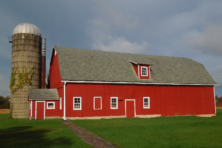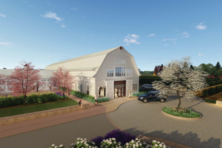Sister Bay Wedding Barn in Jeopardy
- Share
- Tweet
- Pin
- Share
The proposed wedding barn on Fieldcrest Road in Sister Bay is in jeopardy after a neighbor contacted an attorney claiming the changes made to the zoning code constituted spot zoning. The conditional use permit has already been granted and the developers, Sara Anderson and Nick Hofkamp, have purchased the property on the understanding that their project was approved.
In what Plan Commission chair Denise Bhirdo called the “extremely, very unpopular motion,” the commission approved allowing assembly halls through the R-3 (large lot residential) zoning district by a 4 – 2 vote. Commissioners Mary Kay Shumway and Don Howard voted against the change. The decision still needs approval from the village board in April.
An attorney contracted by Northwoods Drive resident Vivian Nienow believed the method used to allow the wedding barn constitutes spot zoning.
The four parcels totaling 30 acres is zoned R-3, or large lot residential. The wedding barn, which the village calls an assembly hall, is not permitted in the R-3 district. Instead of changing the zoning of the parcel to B-1 (general business), which would not give the commission the ability to restrict use of the property, or allowing assembly halls in all of the R-3 district, the village approved assembly halls through a conditional use permit specifically for the four parcels on which the barn would be located.
After receiving a letter from Nienow’s attorney, village attorney Randy Nesbitt suggested that the village should change the zoning code to allow assembly halls in all of the R-3 district to, “be on more stable legal footing”, according to a report from interim Village Administrator Janal Suppanz.
“It sounds to me like a mistake was made and now we’re just going to open up the door to avoid a legal battle,” said village resident Ron MacDonald.
“The question of whether that was spot zoning was brought up,” said Nienow of the early approvals of the wedding barn. “It should have been asked of the attorney and I think that would have avoided all of this mess. In order to avoid the lawsuit you’re going to compound the mistake.”
The wedding barn project was approved on an expedited timeline due to the developer’s need to close on the sale of the property.
Residents feared opening up the entire R-3 district to assembly halls. Fieldcrest resident Kathleen Kuntsman said the change would allow commercial businesses to operate in a district that is explicitly residential.
In its decision, the village also has to consider changes to conditional use permits under a new state law passed in 2017.
Conditional use permits can no longer be denied based on public sentiment. If an applicant can prove they can meet all of the criteria outlined in the permit, a project must be approved no matter how many neighbors are opposed. This change concerns residents in the R-3 district, who feel the village would have no ability to stop new assembly halls from popping up next door.
But one unintended consequence of the state law change is that municipalities may seek to impose such strict conditions in a new permit that the development would be impossible to operate. If a conditional use applicant for a new assembly hall is required to close at 5pm and not be open on weekends, it would functionally stop the development from happening. Whether that practice can survive a legal challenge will be decided in court cases that are expected to come up as the new law takes effect.
The plan commission’s approval is not final. The village board is expected to consider final approval of the proposed zoning change at its April meeting.


